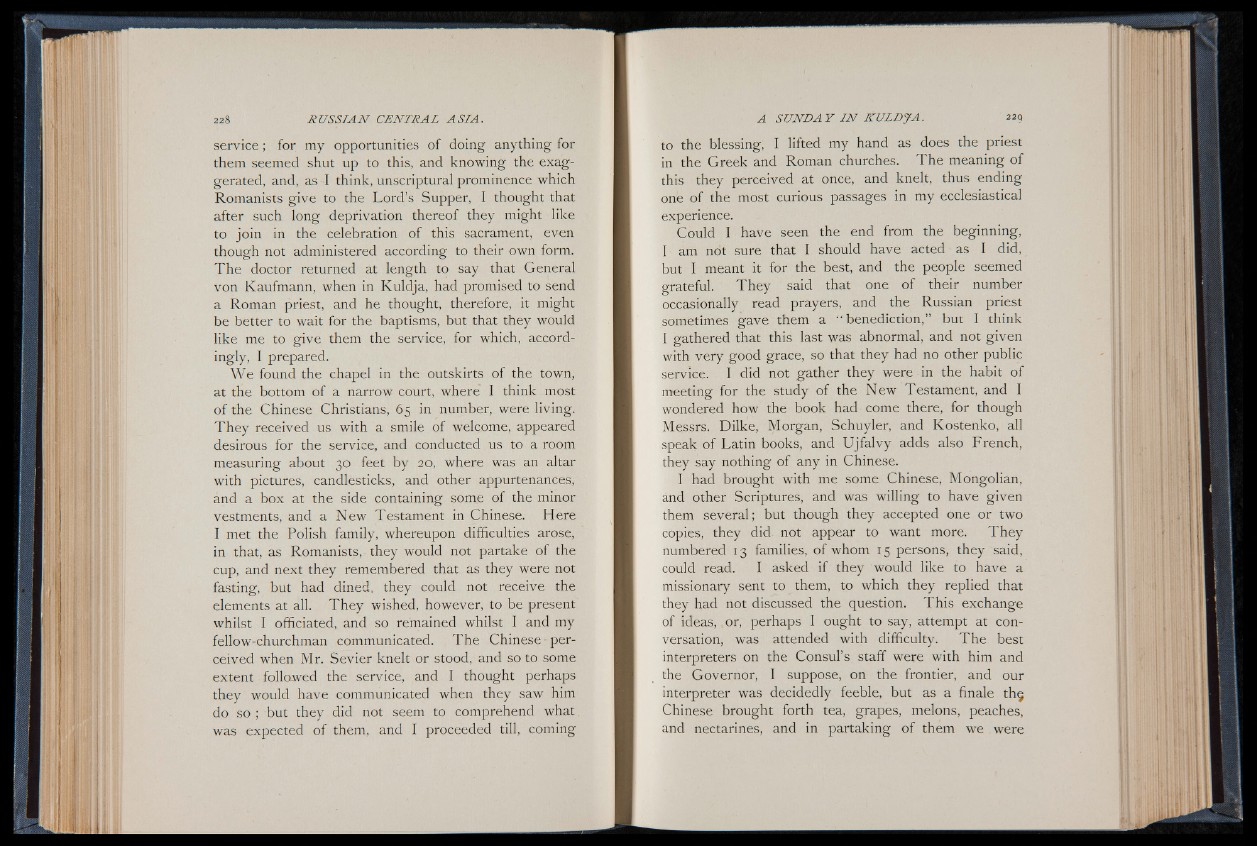
service; for my opportunities of doing anything for
them seemed shut up to this, and knowing the exaggerated,
and, as I think, unscriptural prominence which
Romanists give to the Lord’s Supper, I thought that
after such long deprivation thereof they might like
to join in the celebration of this sacrament, even
though not administered according to their own form.
The doctor returned at length to say that General
von Kaufmann, when in Kuldja, had promised to send
a Roman priest, and he thought, therefore, it might
be better to wait for the baptisms, but that they would
like me to give them the service, for which, accordingly,
I prepared.
We found the chapel in the outskirts of the town,
at the bottom of a narrow court, where* I think most
of the Chinese Christians, 65 in number, were living.
They received us with a smile of welcome, appeared
desirous for the service, and conducted us to a room
measuring about 30 feet by 20, where was an altar
with pictures, candlesticks, and other appurtenances,
and a box at the side containing some of the minor
vestments, and a New Testament in Chinese. Here
I met the Polish family, whereupon difficulties arose,
in that, as Romanists, they would not partake of the
cup, and next they remembered that as they were not
fasting, but had dined, they could not receive the
elements at all. They wished, however, to be present
whilst I officiated, and so remained whilst I and my
fellow-churchman communicated. The Chinese ■ perceived
when Mr. Sevier knelt or stood, and so to some
extent followed the service, and I thought perhaps
they would have communicated when they saw him
do so ; but they did not seem to comprehend what
was expected of them, and I proceeded till, coming
to the blessing, I lifted my hand as does the priest
in the Greek and Roman churches. The meaning of
this they perceived at once, and knelt, thus ending
onfe of the most curious passages in my ecclesiastical
experience.
Could I have seen the end from the beginning,
I am not sure that I should have acted as I did,
but I meant it for the best, and the people seemed
grateful. They said that one of their number
occasionally read prayers, and the Russian priest
sometimes gave them a “ benediction,” but I think
I gathered that this last was abnormal, and not given
with very good grace, so that they had no other public
service. I did not gather they were in the habit of
meeting for the study of the New Testament, and I
wondered how the book had come there, for though
Messrs. Dilke, Morgan, Schuyler, and Kostenko, all
speak of Latin books, and Ujfalvy adds also French,
they say nothing of any in Chinese.
I had brought with me some Chinese, Mongolian,
and other Scriptures, and was willing to have given
them several; but though they accepted one or two
copies, they did not appear to want more. They
numbered 13 families, of whom 15 persons, they said,
could read. I asked if they would like to have a
missionary sent to them, to which they replied that
they had not discussed the question. This exchange
of ideas, or, perhaps I ought to say, attempt at conversation,
was attended with difficulty. The best
interpreters on the Consul’s staff were with him and
the Governor, I suppose, on the frontier, and our
interpreter was decidedly feeble, but as a finale th§
Chinese brought forth tea, grapes, melons, peaches,
and nectarines, and in partaking of them we were